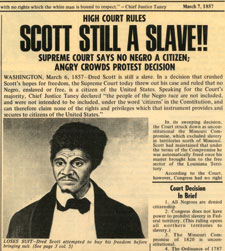Dred Scott, and the Dredful Tales of Slavery
Today In History, March 5th

March 5, 2018
In 1857, four years before the civil war, one of the most destructive decisions made by the US government was made: The Dred Scott Decision.
The Dred Scott decision was a ruling by the Supreme Court on the case of slavery. This case was brought to the attention of the Supreme court by Dred Scott, a slave who had spent time in states where slavery was illegal such as Illinois and the territory of Wisconsin.
Chief Justice Roger B. Taney wrote the majority decision, which was issued on March 6, 1857. The court held that Scott was not free based on his residence in either Illinois or Wisconsin because he was not considered a person under the U.S. Constitution because, in the opinion of the justices, black people were not considered citizens when the Constitution was drafted in 1787. And according to Taney, Dred Scott was the property of his owner, and property could not be taken from a person without due process of law.
This decision made regional tensions explode, leading to further separation between the Pro-Slavery groups, and the Anti-Slavery groups, causing tremendous effects such as the separation of the Democratic Party into the Northern Democrats, and the Southern Democrats, and ultimately attributed to the Civil War.

